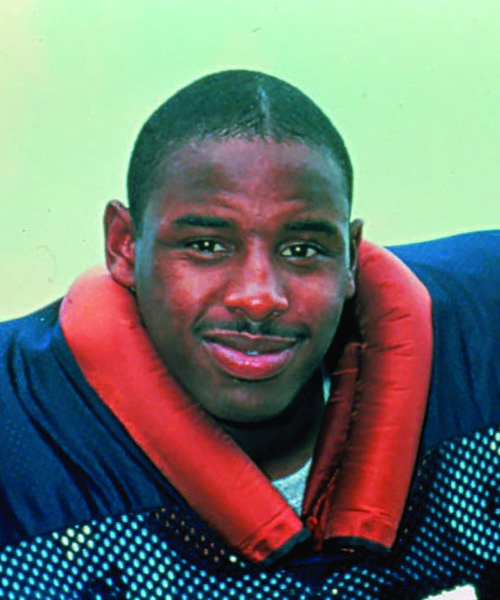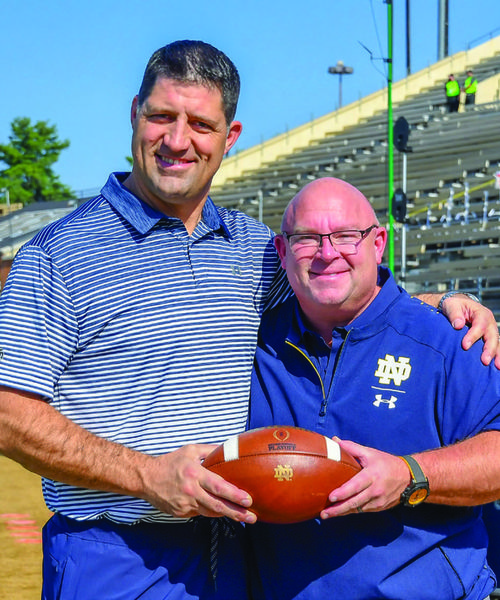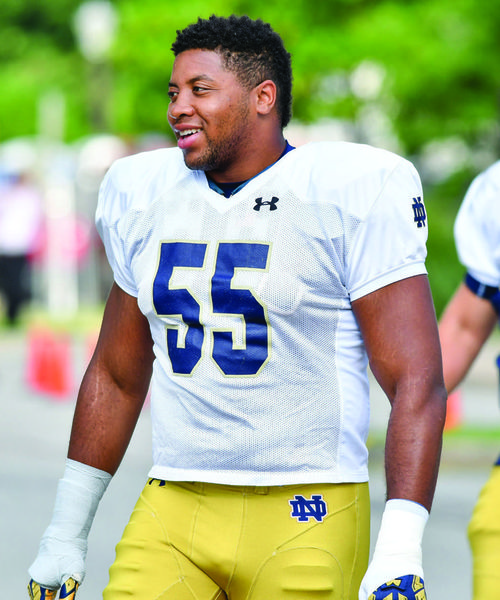
Corny Southall
Protection for All
He went from as far as he could be at one end of the spectrum to as far as he could be at the other end.
That was reality three decades ago for former University of Notre Dame football defensive back Corny Southall.
In 1988, as a senior free safety from Rochester, New York, he played a key defensive role for the Irish, starting five times and helping Lou Holtz’s team to a national championship.
He couldn’t have been more visible, given all the attention the Irish received that season with wins over top-ranked Miami, second-rated and unbeaten USC and then third-ranked West Virginia in the Fiesta Bowl.
Two years later he found himself playing a similar key role from a national security standpoint for the United States Secret Service— yet this time it qualified as the ultimate behind-the- scenes assignment.
Southall’s specific duties were known only to his family and a few Secret Service associates — with secrecy deemed such that he often was not allowed to articulate exactly where he was going and what he was doing.
That’s how it works when you’re providing security for U.S. presidents, foreign heads of states, other top political figures and their families.
Interestingly enough, Southall’s work with the Secret Service didn’t come about by accident. He had three different experiences at Notre Dame that convinced him this was his destiny:
—“My first experience with the Secret Service was my sophomore year at Notre Dame and George H. W. Bush (41) came to a football game in 1986 because he was a big Penn State fan,” says Southall.
“The Secret Service sent out the advance team and they all came to the practice field, with President Bush and Coach (Lou) Holtz, and both of them spoke to our team.” —Adds Southall, “My next experience was my junior year when President (Ronald) Reagan came to Notre Dame to dedicate the Knute Rockne stamp to the University.
“Coach Holtz invited the 22 starters from the team and Tim Brown, who had just won the Heisman Trophy earlier that year, to be at the arrival point in the JACC for President Reagan. President Reagan’s motorcade arrived at the JACC where he got out of the limo and greeted the team during our receiving line for him.”
Southall happened to be at the end of the line, next to Coach Holtz and Secret Service director John Simpson.
“We were all excited to shake President Reaganʼs hand,” says Southall. “Then, Simpson turned to Coach Holtz and said, ‘Notre Dame is a wonderful school. Love your school. Great young men. If there is anyone that is ever interested in becoming part of the Secret Service, here is my card. Give me a call.’
“I hear that and I filed it away and didnʼt think anything about it.”
—“Then next football season we win the national championship and go to the White House to celebrate our championship. This was another experience with the Secret Service,” Southall adds.
Southall was not selected in the 1989 National Football League Draft, and, though he had hopes of having free-agent opportunities, he knew it also was time to make additional career plans beyond football.
“I met with Coach Holtz after the football season and after the draft and he made a call to the Indianapolis Colts to give me a chance to work out for them,” Southall recalls.
“Then he said, ‘Is there anything else you would like to do beyond football?’
“And I said, ‘Remember last year when President Reagan came to Notre Dame and you were standing next to the director? He said if there was anybody that was ever interested to let him know.’
“And Coach Holtz said, ‘Yeah,’ he turns to his Rolodex, scrolls through, pulls out the card, calls the director, has a conversation with him and hangs up.
“He turns to me and says, ‘Theyʼre going to fax you a form. You need to fill it out and in the next couple days you have an interview in Indianapolis at their field office.’
“Iʼm like, ‘Holy cow, what?’ At the time, I didnʼt understand how it all worked.”
Southall ultimately was cut by the Colts, but in between the football process he was undergoing various medical testing and other preparation for the Secret Service. A governmental hiring freeze put that career on hold, so he signed a free-agent contract with Buffalo in January 1990.
This time Southall made it to the final cut-down before the Bills took him off their roster. Once the hiring freeze ended the Secret Service offered him a job that December and he started his training the next month.
That began a 27-and-a-half-year career that saw him protect every president from Richard M. Nixon all the way to Donald J. Trump.
“I think thatʼs unique,” says Southall. “I drove President Nixon one night when I was a junior agent in New York City and he was living in New Jersey. I had the opportunity to spend an evening with him, and for every president since then Iʼve had some type of protection responsibility.” Along the way, Southall found a little intrigue, a little mystery, a little danger, a little excitement.
“I started my career in my hometown. I would say 30 percent of my time I was working criminal cases in Rochester, New York and Buffalo and also doing protection work as a young Secret Service agent, flying all over the country and all over the world,” he says.
“One of those assignments as a young agent brought me back to Notre Dame when President Patricio Aylwin of Chile attended the Notre Dame commencement for his son. I was there as part of the advance team. It was a great feeling being back at Notre Dame and doing the job I loved at a place that meant so much to me.”'
After the stint in Rochester, Southall transferred to the New York field office where he did undercover work, investigating credit card fraud and counterfeit cases and providing protection for presidents and foreign heads of state.
Next he transferred to Washington, D.C., to become part of the Presidential Protection Division (PPD).
“My first three years on that detail were with President (Bill) Clinton, which were his last three years in office. My next two years on PPD were with President George W. Bush (43),” Southall says.
One workday at the White House found Southall standing in front of the Oval Office with President Clinton in the room behind him.
Says Southall, “The door was closed and Clinton’s main staff person runs out of the secretaryʼs office, and I hear him say, ‘I believe heʼs late. Holtz is never late.’
“At that point I’m thinking, ‘There is no way theyʼre talking about Coach Lou Holtz.’ Iʼm standing there waiting, and the aide runs back in, and heʼs running because theyʼre waiting for this individual to show up and now theyʼre behind schedule.
“As he is running out of the office again, I stopped him and said, ‘I know youʼre waiting for someone and I heard Holtz.’ He turns to me and says, ‘Yeah, Lou Holtz from Notre Dame is supposed to meet with President Clinton and heʼs late.’ Coach Holtz is NEVER late!
“I’m standing outside the office of Betty Currie, the secretary for President Clinton. All of a sudden I hear that familiar voice. Iʼm standing at the door and I donʼt say a word.
“Coach Holtz comes around the corner and he just stops and looks at me and he yells, ‘Corny Southall, oh, my goodness.’
“He runs over, I go to shake his hand and he gives me a big bear hug. And Iʼm just trying to maintain my composure.
“All this is going on outside the Oval Office, and President Clinton comes out and says, ‘What the heck is going on out here? Whatʼs all the commotion?’
“Iʼm standing there and Iʼm worried about getting in trouble from work, and Coach Holtz says, ‘Do you know who this is? Do you know who this is?’
“And President Clinton is looking at me like, ‘No, I donʼt know who he is. Heʼs one of my agents, one of my Secret Service guys.
“So Coach Holtz says, ‘This is Corny Southall, one of my players who won a national title. Great young man. Great family. How are your parents?’
“Coach Holtz starts talking to me and not really saying anything to the president.
“And now you have the official photographer who came to take pictures of Coach Holtz and President Clinton. And Coach Holtz says, ‘Get in the picture.’ So Iʼm standing there in all of my gear for work and having my picture taken with the president of the United States and Coach Holtz. It was fantastic!”
Southall also recalls another time he was at Camp David with President Clinton. Notre Dame was playing Michigan at Notre Dame and the game was being televised that afternoon.
“President Clinton was supposed to fly back to the White House and he was having guests over to watch several college football games,” says Southall.
“Well, he was running late, and the weather back in D.C. turned for the worse. The choppers could not fly so we had to drive him back to the White House. That particular day I was the limousine driver because I was assigned to the transportation section.
“I’m the driver with our immediate boss to my right — and with President Clinton in the back seat. Itʼs about a two-hour drive, making our way down the mountain to get on the 270 expressway en route to Washington, D.C.
“As weʼre headed to the White House, and President Clinton just starts talking to (my boss) the detail leader. Theyʼre talking about sports and college football.
“The detail leader turns to President Clinton and he says, ‘What games are you going to watch today? I know you have a bunch of people waiting at the White House.’
“And President Clinton says, ‘Oh, Notre Dame is playing so Iʼm hoping we get back in time to watch the game.’
“Iʼm minding my own business. Thatʼs what you do when you’re driving — you donʼt chime in. You donʼt say a word. You just continue to drive.
“Theyʼre conversing back and forth about Notre Dame, how the season is going and do they have a chance at the championship, so on and so forth. President Clinton mentions that the ND team is different without Coach Lou Holtz on the sidelines.”
“Finally the detail leader tells President Clinton, ‘This young man used to play for Lou Holtz at Notre Dame. ‘President Clinton says, ‘Oh, you did?’
“So now you have me trying to concentrate on driving the limousine, and you donʼt want to have an accident. But you donʼt want to be rude because youʼre trying to have an intelligent conversation with the leader of the free world in the back seat.
“So for the next hour and a half, President Clinton is peppering me with questions about the defense, the offense and my experience at Notre Dame and what do I think about Coach Holtz and why did he leave Notre Dame?
“It was one of those unique situations where there were just three people in the limo, driving on the highway and having a meaningful conversation, just like you would do with your family — except I have the president of the United States sitting in the back seat behind me.”
Southall calls his return to campus for the 2001 Bush commencement speech “one of the biggest accomplishments I ever had. It brought both my worlds back together again.”
He also served as the lead agent for the first anniversary of 9/11 when President Bush went to the Pentagon, then to Pennsylvania — and then to New York City.
Says Southall, “Then he stayed another week for the United Nations. Tack on having to orchestrate all the federal agencies and the New York police departments and everyone else thatʼs involved in such a major and truly emotional event.”
He also served as the lead agent for the 2002 Salt Lake City Winter Olympics in Salt Lake City, Utah.
He left the presidential detail and next went to work on Capitol Hill with various senators and congressional members. He then was assigned to the Secret Service Training Academy and became the supervisor of Detail Training for all senior agents. He also worked a handful of campaigns, in various capacities.
Adds Southall, “But the highlight of my career was having the honor of protecting and being with the Obama family for 14 months prior to them winning the White House.
“It was my responsibility, along with my team, to protect Mrs. Obama, Sasha and Malia for 14 months. I was with their family more than I was with my own family during those months leading up to when President Obama took the oath of office in January 2009.
“Every three weeks I flew from D.C. to Chicago, and I was there for three straight weeks. I spent an awful lot of time in Chicago. The Hilton Hotel right downtown on Michigan. I spent a lot of time in that hotel! Wherever Mrs. Obama went in the country, thatʼs where I was — three weeks on, three weeks off for 14 straight months.
“At about 10 o’clock the night before the 2009 inauguration, I said, ‘Congratulations and it was a pleasure to serve and protect you,’ to Mrs. Obama and the girls. Then my team was going to turn the protection responsibilities over to the presidential detail — and at that point my assignment was complete ...”
After that tour of duty, Southall transferred to the Washington field office as a supervisor, mostly responsible for various protection details within Washington, D.C.
“I had the pleasure of taking Malia and Sasha to their first day of school at Sidwell Friends here in Washington, D.C.,” he says.
From there he took a 19-month assignment in Philadelphia where he prepared the office for the Popeʼs visit, planned for a compliance inspection and ultimately helped prepare for the Democratic National Convention. Southall then finished out the final two years of his career as a deputy special agent in charge of the Inspection Division (internal affairs). He carried a weapon with him every day on the job for more than 27 years.
He retired June 30 and has no regrets.
“I had a fabulous career. Very proud of what I did, what I stand for. I love our country. I love Notre Dame. I believe
I have been blessed to have been able to share both of those worlds at various times throughout my career and throughout my life,” he says.
For now, Southall, at age 51, calls himself a happy homemaker. He’s still planning his next act.
“Iʼm on hiatus at the moment. After all those years of traveling and dealing with issues and the government, it was just time to move on. My wife and I have three beautiful children — 16, 14 and 12. And teenagers need their parents involved in their lives right now.
“I take the kids to school. I make all their sporting events. I cook dinner. Iʼm catching up with friends. I call (former Irish players) Mark Green or D’Juan Francisco or George Streeter on a weekly basis. I try and get back to (Notre Dame) games. Iʼm just enjoying life.”
Southall has never forgotten being on the Notre Dame Stadium field in 1986, looking east toward the Joyce Center and seeing snipers on the roof.
“It was very hard to miss,” he says. “You had those white buildings and two people standing up there in black uniforms.
And I came to appreciate that once I went to the presidentʼs detail and had the pleasure of meeting with and working with these gentlemen.”
Southall learned something about playing with pressure as an Irish football player — then he lived it every day in his career.
“We have to be right all the time. Everything must be prepared correctly all the time. Every day must be a perfect day! The bad guy only has to be right one time,” he says.
Southall remembers one time when he determined a presidential visit would not be appropriate.
“I was doing an advance overseas and President Bush was supposed to come to this particular country — I wonʼt name the country. He was supposed to visit three or four cities.
“But in the city where we were, we werenʼt quite sure if it was going to be the best thing for our president of the United States to come to that particular location.
“Ultimately they decided that, yes, he should go; he needed to go. But there was a heightened alert in the city we were in, a concern for his safety and everyoneʼs safety.
“We decided that he shouldnʼt go to the event in that location based on information we received. So we changed the event and took everyone someplace else and not to that particular location.”
Southall doesn’t mind handing off those sort of decisions to someone else after nearly three decades in that role.
After four years as an Irish football player, he thought he knew what “exposure” was all about.
His Secret Service career taught him the meaning of doing a critical job in comparative anonymity.

